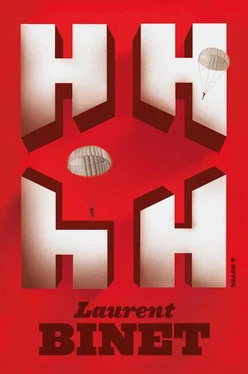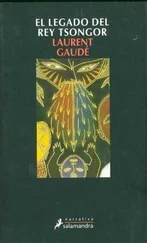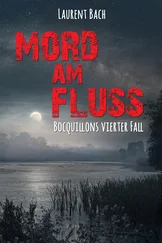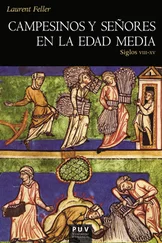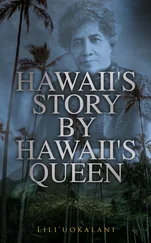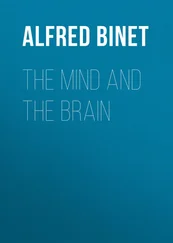How can you tell the main character of a story? By the number of pages devoted to him? I hope it’s a little more complicated than that.
Whenever I talk about the book I’m writing, I say, “My book on Heydrich.” But Heydrich is not supposed to be the main character. Through all the years that I carried this story around with me in my head, I never thought of giving it any other title than Operation Anthropoid (and if that’s not the title you see on the cover, you will know that I gave in to the demands of my publisher, who didn’t like it: too SF, too Robert Ludlum, apparently). You see, Heydrich is the target, not the protagonist. Everything I’ve written about him is by way of background. Though it must be admitted that in literary terms Heydrich is a wonderful character. It’s as if a Dr. Frankenstein novelist had mixed up the greatest monsters of literature to create a new and terrifying creature. Except that Heydrich is not a paper monster.
I’m all too aware that my two heroes are late making their entrance. But perhaps it’s no bad thing if they have to wait. Perhaps it will give them more substance. Perhaps the mark they’ve made in history and on my memory might imprint itself even more profoundly in these pages. Perhaps this long wait in the antechamber of my brain will restore some of their reality, and not just vulgar plausibility. Perhaps, perhaps… but nothing could be less sure! I’m not scared of Heydrich anymore. It’s those two who intimidate me.
And yet I can see them. Or let’s say that I am beginning to discern them.
On the borders of eastern Slovakia is a city I know well—Košice. This is where I did my military service: I was the sublieutenant responsible for teaching French to the Slovakian air force’s young future officers. Košice is also the town where Aurélia—the beautiful Slovak woman with whom I had a passionate five-year relationship, nearly ten years ago now—was born. And incidentally, it is, of all the world’s cities I’ve ever visited, the one with the highest concentration of pretty girls. And when I say pretty, I mean exceptionally beautiful.
I don’t see any reason why this should have been any different in 1939. The pretty girls stroll eternally on Hlavná ulica—the long main street that is the heart of the town, lined by gorgeous pastel-colored Baroque houses, with a magnificent Gothic cathedral at its center. Except that, in 1939, you also see German soldiers, who greet the pretty girls discreetly as they pass. Slovakia has indeed gained its independence—the prize for its betrayal of Prague—but it is an independence surveyed by the friendly, searching eyes of Germany.
Jozef Gabčík sees all of this, walking up the grand main street: the pretty girls and the German soldiers. He’s been thinking it over for several months now.
Two years ago he left Košice to work in a chemical factory in Žilina. He has come back today to meet up with his friends from the 14th Infantry regiment, in which he served for three years. Spring is late and the stubborn snow whispers under his boots.
The cafés in Košice rarely open onto the street. Normally, you have to go under a porch, then either up or down a staircase, in order to reach a well-heated room. Gabčík meets his former comrades in such a café that very evening. Reunited over pints of Zlatý Bažant (a Slovak beer whose name means “Golden Pheasant’), everyone is very happy. But Gabčík hasn’t come just to make a social visit. He wants to know where the Slovak army is, and its position with regard to Tiso, the collaborator.
“The field officers have fallen in with Tiso; you know, Jozef, for them, the break with the Czech staff, it’s a chance to get promoted more quickly…”
“The army hasn’t protested: neither the officers nor the troops. It’s a new Slovak army, so they’ve got to obey the new Slovak government. That’s understandable, isn’t it?”
“We’ve wanted independence for years, so who cares how we get it! Tough shit for the Czechs! If they’d treated us better, maybe we wouldn’t be in this situation now! You know as well as I do that the Czechs always got the best jobs. In the government, the army, everywhere! It was a scandal!”
“Anyway, we had no choice: if Tiso hadn’t said yes to Hitler, we’d have been flattened like they were. And yeah, I know it’s a bit like being occupied, but in the end we’ve still got more autonomy than we had with the Czechs.”
“In Prague, you know, German is now the official language! They’re closing all the Czech universities. They’re censoring all Czech culture. They’ve even shot at students! Is that what you want? Believe me, this was the best solution…”
“It was the only solution, Jozef!”
“Why should we have fought when it was Hácha himself who told us to surrender? All we were doing was obeying orders.”
“Beneš? Yeah, yeah, but he’s fighting the war from London—that’s much easier. Us poor bastards are stuck here.”
“And all of this is his fault. He signed the Munich Agreement, didn’t he? He didn’t send us to fight for the Sudetenland, remember? At the time, our army might have been able to put up a fight—I say might have been!—with the Germans… But now, what could we do? Have you seen the numbers of the Luftwaffe? You know how many bombers they’ve got in service? They’d cut through us like butter. We’d be massacred!”
“I don’t want to die for Hácha—or for Beneš!”
“I don’t want to die for Tiso either!”
“All right, so there are a few German soldiers hanging around the city. So what? I’m not going to pretend I like it, but it’s not as bad as a real military occupation. Go and ask your Czech friends!”
“I’ve got nothing against the Czechs but they’ve always treated us like peasants. I went to Prague once and they pretended they couldn’t understand me because of my accent! They’ve always despised us. Now let’s see how they get on with their new compatriots! We’ll see if they prefer the German accent!”
“Hitler got what he wanted. He said he wouldn’t make any more territorial claims. And us, we’ve never been part of the German zone. Anyway, if it wasn’t for him, Hungary would have swallowed us up, Jozef! You have to see things how they are.”
“What do you want? A coup d’état? No general would have the balls to do that. And even if one did, what would happen afterward? We take on the German army on our own? You think France and England would suddenly rush to our aid? We spent a whole year waiting for them!”
“Listen, Jozef, you’ve got a steady job: go back to Žilina, find yourself a nice girl, and forget about all this. We didn’t come out of it too badly in the end.”
Gabčík has finished his beer. It’s already late, and he and his comrades are slightly drunk. Outside, it’s snowing. He stands up, waves goodbye to his friends, and goes to retrieve his coat from the cloakroom. While a young girl is serving him, one of his companions comes over. He whispers:
“Listen, Jozef, if you want to know, when the Czechs were demobilized after the Germans arrived, some refused to return to civilian life. Perhaps out of patriotism or perhaps because they didn’t want to find themselves unemployed, I don’t know. But anyway, they went to Poland and they’ve formed a Czechoslovak liberation army. I don’t think there are many of them, but I know there are some Slovaks involved. They’re based in Kraków. You see, if I did that, I’d be considered a deserter, and I can’t leave my wife and kids. But if I were your age, and if I were single… Tiso is scum, that’s what I think, and most of the other guys too. We haven’t all turned into Nazis, you know. But we’re shit-scared. What’s happening in Prague is terrible—they’re executing anyone who shows the slightest sign of protesting. Me, I’m going to try to live with the situation. I won’t overdo it, but I’ll go along with them. As long as they don’t start telling us to deport the Jews…”
Читать дальше
